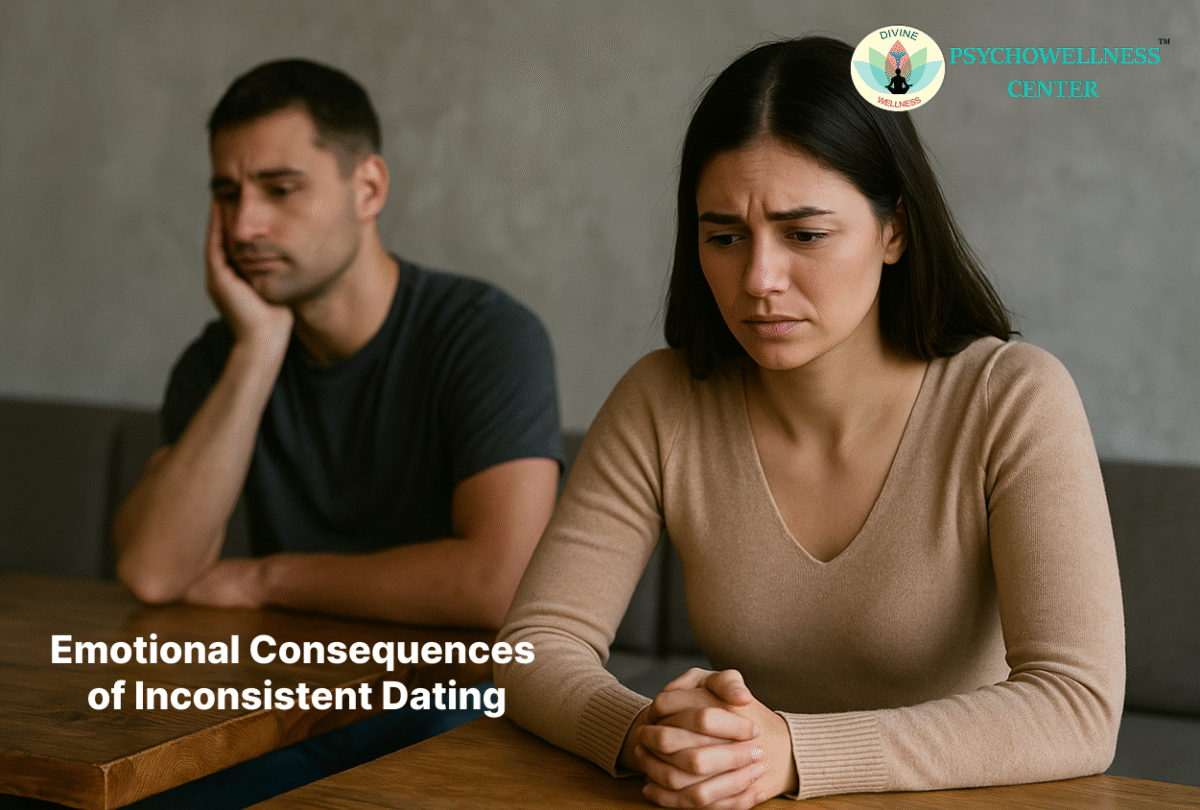In today’s fast-paced, digital dating culture, many individuals find themselves caught in patterns of inconsistent dating relationships that lack stability, clear communication, or commitment. These “situationships,” on-again/off-again flings or hot-and-cold romantic entanglements, can seem exciting at first, but over time, they can have serious emotional consequences. While the freedom and casual nature of modern dating can be liberating for some, inconsistent dating often leads to dating concerns, confusion, emotional distress, and psychological harm.
What Is Inconsistent Dating?
Inconsistent dating refers to romantic interactions that are unpredictable in frequency, communication, or emotional availability. One partner might express deep interest for a few days or weeks, then become distant or unresponsive, only to return later. This behaviour creates an emotional rollercoaster—one moment you feel connected and valued, the next you’re left questioning your worth or the future of the relationship.
Unlike traditional dating, which typically follows a more linear progression—meeting, bonding, building trust, and possibly committing—inconsistent dating offers no clear direction. It often involves mixed signals, vague intentions, and a lack of accountability.
The Emotional Fallout
- Anxiety and Emotional Confusion:- One of the most common emotional consequences of inconsistent dating is anxiety. When a partner’s availability and interest fluctuate unpredictably, it can create a persistent state of uncertainty. You may find yourself overanalyzing every text or social media post, seeking reassurance that your connection is still valid. According to Holmes and Johnson (2020), relationships with low predictability are correlated with higher levels of stress and anxiety and also leads to depression in romantic partners.
- Lowered Self-Esteem:- Being in a dynamic where your emotional needs are inconsistently met can lead to feelings of inadequacy or unworthiness. Over time, you may start to internalise the idea that you’re not “enough” to maintain someone’s attention. This can significantly impact your self-esteem. As noted by Finkel and Eastwick (2015), uncertainty in romantic relationships can lead individuals to feel less desirable and question their value.
- Attachment Trauma:- For those with anxious or avoidant attachment styles, inconsistent dating can be especially triggering. The cycle of emotional closeness followed by withdrawal can mimic early attachment wounds, reinforcing unhealthy relationship patterns. A study by Simpson and Rholes (2017) found that adults with insecure attachment styles experience greater distress in ambiguous or unpredictable romantic relationships, often leading to emotional dysregulation.
- Fear of Vulnerability:- When romantic experiences repeatedly involve inconsistency, individuals may become guarded or emotionally closed off to protect themselves from further hurt. This fear of vulnerability can spill into future relationships, making it difficult to form deep, authentic connections. Ironically, the very desire for connection that fuels dating gets obstructed by a growing fear of being hurt again.
- Cycle of Dependency:- The unpredictable nature of inconsistent dating can create a psychological feedback loop similar to intermittent reinforcement—a concept from behavioural psychology where rewards are given at random intervals. This type of reinforcement is highly addictive (Ainslie, 2020). When applied to dating, this means that people can become emotionally dependent partners who are only occasionally affectionate or available, mistaking inconsistency for passion or chemistry.
Why We Tolerate Inconsistency
Despite the emotional costs, many people tolerate or even return to inconsistent dating patterns. There are several reasons for this:
- Hope for change: The good moments are often so emotionally rewarding that people hope the relationship will stabilise over time.
- Social pressure: The concept of chaotic love tales is romanticised by popular culture, which makes inconsistency look exciting or passionate.
- Fear of being alone: Loneliness or fear of starting over can make people stay in unsatisfying dynamics longer than they should.
- Low relationship literacy: Without a clear understanding of what healthy relationships look like, some may accept inconsistency as normal.
Healing and Moving Forward
Recovering from the emotional toll of inconsistent dating requires self-awareness and intentional healing. Here are a few strategies:
- Set clear boundaries: Know what you want in a relationship and don’t settle for less than consistency, respect, and communication.
- Prioritise self-worth: Practice self-care and engage in activities that boost your confidence and reinforce your value outside of a romantic context.
- Seek secure connections: Whether with friends, therapists, or future partners, focus on relationships that are emotionally safe and stable.
- Reflect on patterns: Journaling or speaking with a counsellor can help you recognise recurring relationship dynamics and why you may be drawn to inconsistency.
Conclusion
Inconsistent dating may feel exciting or even romantic in the short term, but the long-term emotional consequences can be damaging. The first step to developing relationships that are better and more satisfying is recognising these tendencies. If you find yourself caught in the cycle, it’s time to seek relationship counseling. Seeking support, such as relationship counseling near me, can help you gain clarity, set healthy boundaries, and break patterns that no longer serve you. You deserve clarity, emotional safety, and consistent love, not a rollercoaster of uncertainty.
Contributed by Ms. Sheetal Chauhan, Counselling Psychologist
This blog was posted on 25 June 2025
References
- Ainslie, G. (2020). Breakdown of Will. Cambridge University Press.
- Finkel, E. J., & Eastwick, P. W. (2015). Interpersonal attraction: In search of a theoretical Rosetta Stone. Handbook of Social Psychology, 2, 419–469.
- Holmes, B. M., & Johnson, K. J. (2020). Relationship uncertainty and emotional stress: A review of the literature. Journal of Social and Personal Relationships, 37(9), 2345–2362.
- Simpson, J. A., & Rholes, W. S. (2017). Adult attachment, stress, and romantic relationships. Current Opinion in Psychology, 13, 19–24.

